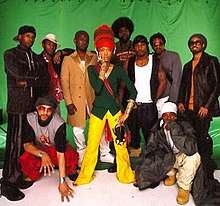Soulquarians
The Soulquarians were a neo soul and alternative hip hop-informed musical collective. The collective, formed during the late 1990s, continued into the early 2000s, and produced several well-received albums. Prior to its formation, members Common, Talib Kweli, Mos Def, and Q-Tip were members of the Native Tongues collective.
The Soulquarians | |
|---|---|
 Left to right: Talib Kweli, Common (kneeling), Mos Def, James Poyser, Erykah Badu, Questlove, D'Angelo, Q-Tip, J Dilla (kneeling), Bilal | |
| Background information | |
| Origin | United States |
| Genres | |
| Years active | Late 1990s – early 2000s |
| Associated acts | |
| Past members |
|
Producer and drummer Ahmir "Questlove" Thompson of hip hop band the Roots acted as the "musical powerhouse" behind several of the collective's projects during the late 1990s and early 2000s, including The Roots' Things Fall Apart (1999), D'Angelo's Voodoo (2000), Erykah Badu's Mama's Gun (2000), and Common's Like Water for Chocolate (2000).[1][2] In an interview for Spin magazine, Common discussed the production of those albums, stating: "It was one of those time periods that you don't even realize when you're going through it that it's powerful".[2]
Background
The name of the collective is derived from an astrology sign. The founding members of the collective—Questlove from the Roots, D'Angelo, James Poyser, and J Dilla—share the sign of Aquarius. Questlove, D'Angelo, Poyser, and J Dilla came together after discovering they had a common interest for the unconventional—offbeat rhythms, irregular chords, and other traits often exhibited by the underground urban music scene. Also around this time, D'Angelo and Welsh bassist Pino Palladino developed a connection over their mutual love of Motown and other classic soul music, and Palladino became active in the project, playing on the majority of their discography and serving as a member of the Soultronics touring band that supported D'Angelo's Voodoo tour.
Many of these artists have performed on one another's records, creating a community of likeminded musicians forging a style that doesn't have a name yet. Organic soul, natural R&B, boho-rap--it's music that owes a debt to the old-school sounds of Marvin Gaye, Bob Marley, Jimi Hendrix and George Clinton without expressly mimicking any of them. It refreshes these traditions with cinematic production techniques gleaned from hip-hop and with attitude that is street- smart but above all highly individual, celebrating quirks instead of sanding them down for mass consumption. Instead of crooning about "booty and blunts" (sex, drugs, etc.), the subject matter on these albums is idiosyncratic and personal, ranging from the spiritual crises of [Lauryn] Hill, D'Angelo and Maxwell to the socio-political concerns of the Roots and Mos Def.[3]
— Greg Kot
Being a collective, the Soulquarians included a rotating list of members, including Common, Mos Def, Talib Kweli, Q-Tip, Erykah Badu and Bilal. In a 2003 interview,[4] Questlove unequivocally stated that there were no plans for a Soulquarians album release for the foreseeable future. This was interpreted as a silent breakup of the outfit. However, according to an interview[5] with Common (circa 2005), the collective continued to exist.
Members
- Questlove – drums, keyboards, production, percussion
- Bilal – vocals
- Common – vocals
- Roy Hargrove (deceased) – trumpet, flugelhorn
- Erykah Badu – vocals, production
- D'Angelo – vocals, guitar, keyboards, production
- James Poyser – keyboards, production
- Mos Def – vocals
- Q-Tip – vocals, production
- Talib Kweli – vocals
- Pino Palladino – bass
- J Dilla (deceased)[6] – vocals, production
Discography
Albums produced wholly or partly by the Soulquarians:
| Year | Artist | Album | RIAA Certification |
|---|---|---|---|
| 1999 | The Roots | Things Fall Apart | Platinum |
| 1999 | Mos Def | Black on Both Sides | Gold |
| 1999 | Q-Tip | Amplified | Gold |
| 2000 | D'Angelo | Voodoo | Platinum |
| 2000 | Common | Like Water for Chocolate | Gold |
| 2000 | Slum Village | Fantastic, Vol. 2 | N/A |
| 2000 | Erykah Badu | Mama's Gun | Platinum |
| 2001 | Bilal | 1st Born Second | N/A |
| 2002 | Talib Kweli | Quality | Gold |
| 2002 | The Roots | Phrenology | Gold |
| 2002 | Common | Electric Circus | N/A |
| 2006 | Bilal | Love for Sale[7] | N/A |
References
- DeRogatis, Jim. "Just Plain Common Sense". Chicago Sun-Times: February 5, 2006. Archived from the original on 2009-08-24.
- Peisner, David. "Body & Soul". Spin: 64–72. August 2008.
- Kot, Greg. "A Fresh Collective Soul?". Chicago Tribune: 1. March 19, 2000.
- "Archived copy". Archived from the original on 2016-03-03. Retrieved 2006-04-03.CS1 maint: archived copy as title (link)
- "Common: It's About Time". MVRemix Interviews: April 2005. Retrieved on 2016-01-21
- Columnist. De La Soul & Common: On the Spitkicker Tour. MTV. Retrieved on 2009-09-30.
- Kellman, Andy (n.d.). "Bilal". AllMusic. Retrieved August 12, 2020.
External links
- Soulquarians at AllMusic
- Soulquarians at Discogs
- Soulquarians — By Vibe
- Soulquarians in the news from MTV News